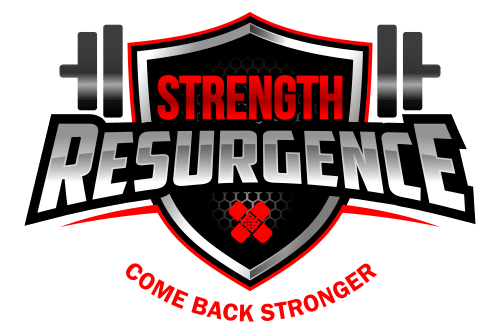There’s something beautiful about individuals committing themselves to becoming a better version of themselves. It’s easier said than done, though, as it’s by no means an easy process.
When it comes to working out, this particular challenge is the epitome of one that is not easy. Workouts can be exhausting, life is busy enough as it is, and workout results can be slow to come by. Does it ever get any easier…and should it?
Here’s the quick two-sentence answer:
The process of working out should involve activities getting easier from a behavioural standpoint and should remain challenging (but doable) from a physical standpoint. Too much continual physical challenge is likely due to poor training parameters, which should then be modified to ensure success.
If you want to learn how to ensure you’ve optimized the challenge of working out, allowing you to make progress without burning out in the process, you’ll want to check out everything I discuss below. I’ll present valuable insight I’ve learned firsthand and discovered from others in my two-plus decades of being committed to working out to improve the health of my mind, body, and spirit.

A small request: If you find this article to be helpful, or you appreciate any of the content on my site, please consider sharing it on social media and with your friends to help spread the word—it’s truly appreciated!
The necessity of challenge: A delicate dance
Exposing ourselves to challenge, while necessary for any type of growth, can be a delicate dance; too little challenge and we don’t reap the rewards but too much challenge and we give up. I don’t want you to think that working out should never be without a certain extent of effort, striving, or challenge, but I also would like you to understand that excessive, prolonged, over-the-top challenge isn’t the key to long-term workout success.
Nonetheless, facing (and embracing) the self-imposed challenges of working out and pursuing a stronger, healthier body is a necessity, albeit in the right amount. This is about striking an optimal challenge (discussed in much more depth later in this article).
Essentially, you’d do well to acknowledge two factors pertaining to the struggle of working out:
- Struggle is necessary, but it must be given in the right dosage.
- Learning to embrace and accept this struggle is necessary for your long-term fitness pursuits.
But as we start off this article, I need to make it clear that learning to embrace the unpleasantness or challenges that are presented when working out (albeit of the ideal amount) is indeed a requisite to becoming a more robust and physically capable human being.
I’ll get to dialling in the optimal amount in a moment.
But first, if you are wondering if working out or exerting ever gets easier, it will likely be helpful to take a step back and determine where exactly you’re incurring too much difficulty in your fitness pursuits. If we can pin down what’s causing you to feel that the challenge is too much for you to take, we just might be able to correct it altogether.
Taking a step back: What needs to change?

Since I’m not quite sure in what ways you feel you need less of a challenge in your workout pursuits, it’s likely a good idea to ask yourself what it might be that is making you wonder (and likely wish) how to make your workout journey more manageable.
In my experiences over the years when working with others, there are two primary realms for which an individual feels their physical fitness pursuits are too difficult to maintain. They are:
- A pursuit that’s too physically exhausting;
- A pursuit that’s too mentally exhausting.
With both of these scenarios, I’m referring to repeated or routine physical or mental exhaustion. We all have the occasional day when our physical energy is low or our mental strength has diminished; this is typical of all of us. Rather, I’m referring to the arduous, day-after-day feeling of needing the challenge to stop pounding you into the ground.
“Facing (and embracing) the self-imposed challenges of working out and pursuing a stronger, healthier body is a necessity, albeit in the right amount. This is about striking an optimal challenge.”
Let’s quickly run through each of these scenarios. As you read on, ask yourself if both of these categories apply to you or merely one of them. I’ll also give you insight into how to make things easier regarding whichever category you may be struggling with.
When working out is too physically exhausting
Workouts should be fatiguing but not exhausting, at least not on a consistent basis. As I always say, the goal of training is to stimulate, not annihilate, your body.
Often, we may have the emotional desire to work out, but we lack the physical energy to do so. It’s normal to have the occasional day here and there where you’re feeling a bit low on energy, but if it’s happening on a regular basis, it’s only a matter of time before you cease working out altogether.
When working out, the goal of training is to stimulate, not annihilate, your body.Click to PostIf you’re struggling with constant physical exhaustion when working out, be sure to read the Optimization section below, where I discuss the concept of minimal effective training dose. This is a scientific training principle used by many top strength coaches and athletes around the world.
RELATED CONTENT:
Before we get to the optimization section, let’s make sure you have some immediate steps you can consider and implement to help with your physical energy to make your workouts seem easier.
If you are constantly low on energy and wondering if working out will ever get easier, here are some strategies to implement immediately:
Strategy 1: Reevaluate your training volume
Training volume refers to the amount of work you perform within a training session. It’s calculated by multiplying the amount of weight you lift by the number of sets and repetitions you perform for all of your exercises. The formula essentially looks like this:
Training volume = total weight lifted x sets performed x total repetitions
The higher your training volume, the more work your body performs within any given session. If you’re feeling absolutely physically beaten or ground down into the ground, reducing your training volume might be a necessary step to make. Whether you choose to drop the amount of weight you’re lifting or the number of sets and repetitions you’re performing, finding a way to reduce your training volume is likely a smart initial step to take.
(You’ll learn more about this concept later in the article when I discuss the principle of minimal effective training dose.)
Pro tip: You can calculate your training volume for a single session, one week, one month, or more; you don’t have to calculate it merely for individual training sessions.
Strategy 2: Reevaluate your sleep routine

Repeat after me: When training, sleep is everything.
I heard it once said that you don’t grow in the gym—you merely stimulate your body in the gym—you grow when sleeping.
Sleep is how your body recovers from stress and affords the optimal environment for the physiologic (hormonal, neural, and structural) recovery of your body’s systems.
Too many people often fall into the trap of thinking they can go heavy on their training and skimp out on their sleep. All this equates to is a recipe for disaster.
If you want to read up more on the importance of sleep and discover how much you likely need to ensure adequate recovery from your workouts, you can check out the following articles:
ARTICLE 1: Sleep, recovery, and performance: the new frontier in high-performance athletics
ARTICLE 2: Sleep hygiene for optimizing recovery in athletes: review and recommendations
Those who are successful with the longevity of their workout pursuits will attest to the importance of sleep and recovery. They take each of these factors as seriously as they do their actual workouts within the gym.
RELATED CONTENT:
Strategy 3: Look at your diet

It’s been said a million times before, and I’ll be one more voice to say it again: you cannot out-train a bad diet.
Diet is more than just a means to get lean and look good. Food is fuel for your body, and it fuels more than your actual workouts—food also fuels your recovery.
Every substance that your body requires for sustaining healthy amounts of energy and adequate recovery ultimately comes from the food you consume. But it’s more than just consuming the right types of food—you must also consume the right amounts.
When you consume inadequate amounts of the macronutrients your body requires for optimal function, you can feel tired, sluggish, weak, foggy, unmotivated, and every other type of adverse feeling that makes working out and physical activity an excessively steep uphill battle.
While the specific dietary strategies to consider are beyond the scope of this article, here are some effective considerations you can look at:
Ensure you’re hitting your macronutrient needs
Macronutrients refer to the fuel sources our body needs for gaining and utilizing energy. There are three types of macronutrients:
- Carbohydrates
- Fats
- Protein
Each of these three fuel sources is required in ideal amounts. Chronically ingesting too little of any of them can lead to problems with energy and performance, making working out feel incredibly challenging, exhausting, and unsustainable.
I like to think of them like the fluid components in a vehicle: a vehicle needs more than gasoline to keep the engine running; it also needs oil and engine coolant, each serving a unique and specific purpose to ensure optimal engine function.
Your body is an engine, and it requires a mixture of fuel sources to keep revving at an ideal intensity and meet the demands of what it’s incurring in your pursuit of physical health and wellness.
When working out is too mentally exhausting

Sometimes our body may be fully charged, but our brain feels depleted, and the thought of working out or getting physically active is therefore overwhelming. When this occurs, it’s all too easy to struggle through our workout session or forego our workouts altogether.
If this resonates with you, it may be that there’s nothing wrong with your workouts or exercises within them, per se, but rather there may be an underlying issue with how you’re viewing them or the expectations you have of them.
In my personal opinion, there should always be something inherently rewarding or fulfilling about working out. Just because a workout leaves you physically tired doesn’t mean it must do the same to your spirits.
It doesn’t mean you must mentally love the exertion of your workout, rather that you can hopefully find something mentally or emotionally rejuvenating about the process of pushing yourself to become a stronger, healthier person.
So, if you’re not experiencing some sort of mental or emotional fulfillment about your workouts, it’s absolutely worth taking a step back and asking yourself why it may be that you’re mentally drained— rather than fulfilled—from working out.
Some ways I often reevaluate my situation when struggling with mental exhaustion include:
- Reevaluating my motives for training. Am I training for the right reasons – reasons I find to be edifying and life-giving (celebrating what my body can do, being grateful for my health, etc.), or am I drifting to be driven by fear and anxiety (not being “good enough” or “looking good enough”)? If I’m driven by the latter rather than the former, I will find my mind drifting to negative, life-draining places rather than life-giving and motivating places.
- Asking myself if I’m overcomplicating what I need for my training; am I making my workouts too complex and drowning in the science of strength training? While I believe in scientifically-sound training, I can at times find myself getting obsessive with adhering to precise or overly complex protocols that seem to be more of a nuisance than a practical approach for strength training. When this happens, I find myself becoming mentally exhausted trying to ensure I adhere to every strict detail and requirement of my program, which makes training mentally exhausting.
- Am I bringing all the stress and chaos of my life into the gym with me? If I am, I’ll often have my mental energy drained as a result. If I can use my workouts as a time where I give myself permission to “shut my mind off” and take a break from what’s weighing me down outside the gym, I’ll often experience a sense of freedom within my training session that is very mentally, and even spiritually reviving. But this only happens when I give myself permission to break away from the stress of life and not dwell on the complexities within my life as I work out.
Related article: Gain Energy and Motivation to Exercise After Work: Here’s How
As such, ask yourself what it might be that’s causing you to feel mentally depleted and subsequently overly challenged with your working out. If you can pin it down, you can likely rectify the issue and get back to feeling less burdened and more free during your workouts.
Optimization: Using Minimal effective dose
The concept of minimal effect training dose is often a game-changer for those who find themselves becoming over-taxed and excessively challenged from their workouts, be it physically or mentally.
The concept involves ensuring an individual performs the least amount of work required to elicit a particular training response or reach a training goal. In essence, it avoids unnecessary amounts of work that might otherwise be performed, which are of no particular benefit and serve no other purpose than to overwork the individual.
When correctly implemented, the concept of minimal effective training dose can help avoid physical exhaustion that can result in conditions such as overreaching and overtraining.Click to PostThink of it this way: if you had a headache, and you could completely wipe it out with a single 81mg tablet of aspirin, there would be no need or benefit of taking two, three, or four tablets.
How to dial in your minimal effective training dose
The concept of the minimal effective training dose is relatively straightforward, but ensuring you’re doing just enough to receive the stimulus you’re after without undergoing can be a bit tricky.
Regarding this, it’s worth knowing that it can take time and effort to dial in your minimal dose. It’s not an entirely perfect science since every person’s body responds to physical exercise differently than the next person’s due to the myriad of physiologic factors (age, overall health, recovery, etc.) that go into what one’s body can tolerate.
If you want some helpful peer-reviewed scientific articles to help you determine what might be an optimal starting point for ensuring you have success with finding your minimal effective training dose, check out any of the ones listed below:
ARTICLE 3: The Minimum Effective Training Dose Required for 1RM Strength in Powerlifters
Final thoughts
Working out shouldn’t be perpetually easy, but it shouldn’t be downright exhausting, either. It can be a bit of a balancing act, and while it should leave you feeling a bit tired, it should ultimately leave you looking forward to your next training session. If you can’t strike this balance, it’ll only be a matter of time before you cease your workout routine and fitness pursuits altogether. Don’t let that happen.
Frequently Asked Questions
To be as helpful as possible, I’ve included a few concise answers below regarding questions individuals often have pertaining to optimal workout intensity and challenge.

Hi! I’m Jim Wittstrom, PT, DPT, CSCS, Pn1.
I am a physical therapist who is passionate about all things pertaining to strength & conditioning, human movement, injury prevention and rehabilitation. I created StrengthResurgence.com in order to help others become stronger and healthier. I also love helping aspiring students and therapists fulfill their dreams of becoming successful in school and within their clinical PT practice. Thanks for checking out my site!

